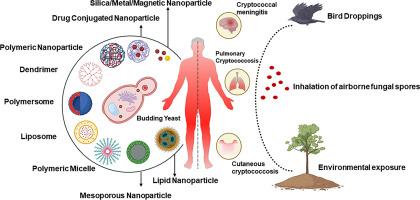Advancing cryptococcal treatment: The role of nanoparticles in mitigating antifungal resistance
IF 4.8
Q1 MICROBIOLOGY
引用次数: 0
Abstract
Cryptococcus, a ubiquitous and formidable fungal pathogen, contributes to a substantial global disease burden, with nearly 250,000 cases and 181,000 fatalities attributed to cryptococcal meningitis annually worldwide. The invasive nature of Cryptococcus presents significant challenges in treatment and management, as it mostly affects vulnerable populations, including HIV patients, organ transplant recipients, pregnant women, and elderly individuals. Moreover, these difficulties are exacerbated by the development of antifungal resistance, which emphasizes the need for efficient control measures. In this context, research efforts focusing on infection control and novel therapeutic strategies become paramount. Nanoparticle-based therapies emerge as a solution, offering advanced antifungal properties and improved efficacy. Developing effective treatment options requires understanding the complex landscape of cryptococcal infections and the innovative potential of nanoparticle-based therapies. This review highlights the urgent need for novel strategies to combat the growing threat posed by antifungal resistance while offering insights into the intricate realm of cryptococcal infections, particularly focusing on the promising role of nanoparticle-based therapies.

推进隐球菌治疗:纳米粒子在减轻抗真菌耐药性方面的作用
隐球菌是一种无处不在的可怕真菌病原体,给全球造成了巨大的疾病负担,全世界每年有近 25 万例病例和 18.1 万人死于隐球菌脑膜炎。隐球菌的侵袭性给治疗和管理带来了巨大挑战,因为它主要影响易感人群,包括艾滋病患者、器官移植受者、孕妇和老年人。此外,抗真菌抗药性的产生也加剧了这些困难,因此需要采取有效的控制措施。在这种情况下,以感染控制和新型治疗策略为重点的研究工作变得至关重要。以纳米粒子为基础的疗法是一种解决方案,它具有先进的抗真菌特性和更好的疗效。要开发有效的治疗方案,就必须了解隐球菌感染的复杂情况以及基于纳米粒子疗法的创新潜力。这篇综述强调了迫切需要新型战略来应对抗真菌耐药性带来的日益严重的威胁,同时深入探讨了隐球菌感染的复杂领域,尤其关注了基于纳米颗粒的疗法所发挥的重要作用。
本文章由计算机程序翻译,如有差异,请以英文原文为准。
求助全文
约1分钟内获得全文
求助全文
来源期刊

Current Research in Microbial Sciences
Immunology and Microbiology-Immunology and Microbiology (miscellaneous)
CiteScore
7.90
自引率
0.00%
发文量
81
审稿时长
66 days
 求助内容:
求助内容: 应助结果提醒方式:
应助结果提醒方式:


